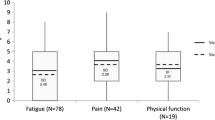Abstract
Purpose
Health-related quality of life (HRQOL) measures typically do not incorporate patients’ preferences for domains such as physical, emotional, functional and social/family well-being, which may compromise precision.
Method
A forced-choice domain-preference measure was developed to assess the importance of HRQOL domains. About 194 cancer patients completed the domain-preference measure, along with measures of HRQOL, coping, adjustment, and life satisfaction.
Results
Patients ranked emotional well-being as most important and the loss of social-family well-being as the most difficult to do without. A weighting algorithm revealed no advantage to incorporating individuals’ domain preferences in HRQOL assessment; however, preliminary evidence suggested that HRQOL measurement may be more accurate in predicting outcomes for individuals with no distinct domain preferences than those with distinct preference profiles.
Conclusion
This study provides preliminary evidence for the validity of current measures of HRQOL, which may inherently take into account patients’ domain preferences.
Similar content being viewed by others
References
Jemal, A., Siegel, R., Ward, E., Murray, T., Xu, J., & Thun, M. (2007). Cancer statistics, 2007. CA: A Cancer Journal for Clinicians, 57, 43–66. doi:10.3322/canjclin.57.1.43.
American Cancer Society. (2009). Cancer facts and Figs 2009. Atlanta: American Cancer Society.
Cella, D., & Tulksy, D. (1993). Quality of life in cancer: Definition, purpose, and method of measurement. Cancer Investigation, 11, 327–336. doi:10.3109/07357909309024860.
Soni, M., & Cella, D. (2002). Quality of life and symptom measures in oncology: An overview. The American Journal of Managed Care, 8, S560–S573.
Smith, A., Velikova, G., Wright, E., Lynch, P., & Selby, P. (2006). Computer-assisted questionnaires may facilitate quality-of-life (QOL) data: At a cost. Computers in Human Behavior, 22, 991–1000. doi:10.1016/j.chb.2004.03.019.
Guyatt, G., Feeny, D., & Patrick, D. (1993). Measuring health-related quality of life. Annals of Internal Medicine, 118, 622–629.
Nanda, U., & Andresen, E. (1998). Health-related quality of life. A guide for the health professional. Evaluation & the Health Professions, 21, 179–215. doi:10.1177/016327879802100204.
Velikova, G., Booth, L., Smith, A., Brown, P., Lynch, P., Brown, J., et al. (2004). Measuring quality of life in oncology practice improves communication and patient well-being: A randomized controlled trial. Journal of Clinical Oncology, 22, 714–724. doi:10.1200/JCO.2004.06.078.
Oldridge, N. (1996). Outcomes measurement: Health-related quality of life. Assistive Technology, 8, 82–93.
Gelber, R., Goldhirsch, A., & Cavalli, F. (1991). Quality-of-life-adjusted evaluation of adjuvant therapies for operable breast cancer. Annals of Internal Medicine, 114, 621–628.
Tamburini, M. (2001). Health-related quality of life measures in cancer. Annals of Oncology, 12, S7–S10. doi:10.1023/A:1013078511828.
Varricchio, C. (2006). Measurement issues in quality of life assessments. Oncology Nursing Forum, 33, S13–S21. doi:10.1188/06.ONF.S1.13-21.
Cella, D., et al. (1993). The functional assessment of cancer therapy scale: Development and validation of the general measure. Journal of Clinical Oncology, 11, 570–579.
Cheung, Y., Khoo, K., Wong, Z., See, H., Toh, H., Epstein, R., et al. (2003). Quick-FLIC: A short questionnaire for assessing quality of life in cancer patients. Acta Oncologica, 42, 36–42. doi:10.1080/0891060310002212.
Degi, C. (2006). An analysis of the effectiveness of psycho-oncological interventions in view of quality of life and survival outcomes of cancer patients. Psychiatria Hungarica, 21, 138–146.
Browne, J., O’Boyle, C., McGee, H., McDonald, N., & Joyce, C. (1997). Development of a direct weighting procedure for quality of life domains. Quality of Life Research, 6, 301–309. doi:10.1023/A:1018423124390.
Muldoon, M., Barger, S., Flory, J., & Manuck, S. (1998). What are quality of life measurements measuring? British Medical Journal, 316, 542–545.
Ruta, D., Garratt, A., Leng, M., Russell, I., & MacDonald, L. (1994). A new approach to the measurement of quality of life: The patient generated index (PGI). Medical Care, 32, 1109–1126. doi:10.1097/00005650-199411000-00004.
O’Boyle, C., Browne, J., Hickey, A., McGee, H., & Joyce, C. (1995). Schedule for the evaluation of individual quality of life (SEIQoL): A direct weighting procedure for quality of life domains (SEIQoLDW). Dublin, UK: Administration Manual; Department of Psychology, Royal College of Surgeons.
Gorbatenko-Roth, K., Levin, I., Altmaier, E., & Doebbeling, B. (2001). Accuracy of health-related quality of life assessment: What is the benefit of incorporating patients’ preferences for domain functioning? Health Psychology, 20, 136–140. doi:10.1037/0278-6133.20.2.136.
Osoba, D., Hsu, M., Copley-Merriman, C., Coombs, J., Johnson, F., Hauber, B., et al. (2006). Stated preferences of patients with cancer for health-related quality-of-life (HRQL) domains during treatment. Quality of Life Research, 15, 273–283. doi:10.1007/s11136-005-0580-5.
Merluzzi, T. V., Nairn, R. C., Hegde, K., Martinez Sanchez, M. A., & Dunn, L. (2001). Self-efficacy for coping with cancer: Revision of the cancer behavior inventory (version 2.0). Psycho-Oncology, 10, 206–217. doi:10.1002/pon.511.
Diener, E., Emmons, R. A., Larsen, R. J., & Griffin, S. (1985). The satisfaction with life scale. Journal of Personality Assessment, 49, 71–75. doi:10.1207/s15327752jpa4901_13.
Derogatis, L. R., & Derogatis, M. F. (1990). The psychological adjustment to illness scale: Administration scoring, and procedures manual. Towson, MD: Clinical Psychometric Research.
Cole, D. A., Howard, G. S., & Maxwell, S. E. (1981). Effects of mono- versus multiple operationalization in construct validity efforts. Journal of Consulting and Clinical Psychology, 49, 395–405. doi:10.1037/0022-006X.49.3.395.
Dobrez, D., Cella, D., Pickard, S., Lai, J., & Nickolov, A. (2007). Estimation of patient preference-based utility weights from the Functional Assessment of Cancer Therapy–General. Value in Health, 10(4), 266–272. doi:10.1111/j.1524-4733.2007.00181.x.
Author information
Authors and Affiliations
Corresponding author
Rights and permissions
About this article
Cite this article
Philip, E.J., Merluzzi, T.V., Peterman, A. et al. Measurement accuracy in assessing patient’s quality of life: to weight or not to weight domains of quality of life. Qual Life Res 18, 775–782 (2009). https://doi.org/10.1007/s11136-009-9492-0
Received:
Accepted:
Published:
Issue Date:
DOI: https://doi.org/10.1007/s11136-009-9492-0




